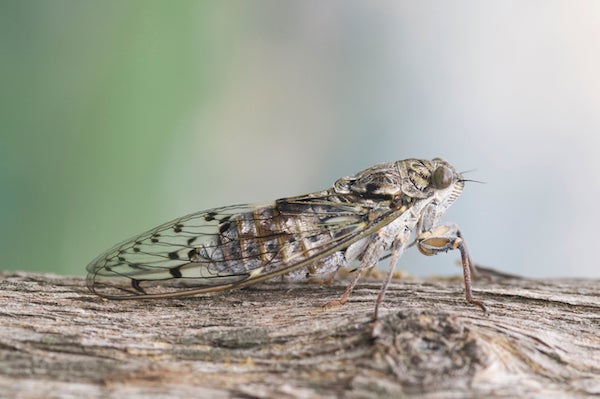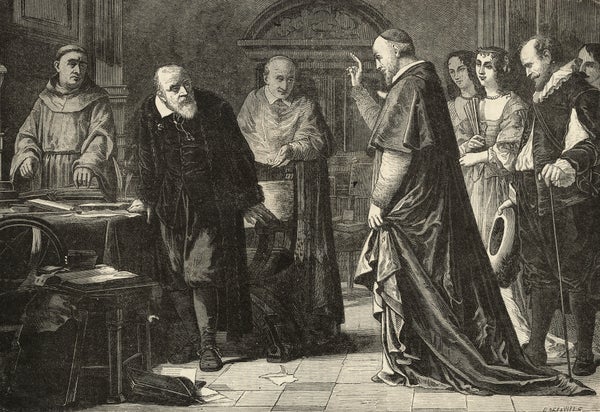How do cicadas make such loud noises? Many of us were asking this question over the past weeks in the cacophonous buzz of cicadas that emerged by the millions in May and June in Maryland, Virginia and other states. What most people don’t realize, however, is that in asking this question we are following in the footsteps of one of the greatest scientists of all time. The scientist was Galileo Galilei, and his question about cicada sounds played a key role in his dealings with the Catholic Church—especially in his attempts to win the good graces of the Pope. More importantly, the results of this cicada episode challenge commonly held beliefs about science and religion.
In 1623, right before the publication of one of Galileo’s most important books (The Assayer), his good friend, Cardinal Maffeo Barberini, was elected Pope. Galileo immediately halted the printing process in Rome in order to dedicate it to him instead of the Medici family, to whom he had dedicated his previous book. Cardinal Barberini was a lavish sponsor of the arts and sciences, and, as Pope, he gathered under his wing some of the best artists and painters. Galileo was fully aware of this since he had previously been the object of Cardinal Barberini’s praises. Now, he also wanted to benefit from Barberini’s promotion to the top of the church’s hierarchy. In Galileo’s words, this was "a marvelous conjuncture," because he could have his conviction that the Earth moved around the sun, and not the other way around, approved by the Pope himself. Or so he thought.
In this book, Galileo wrote one of the most famous quotes in the history of science: that “the book of nature is written in the language of mathematics.” Yet, the excerpt that the Pope liked the most was not about mathematics, but about cicadas. In a brilliant display of literary skills, Galileo carefully planned the book to culminate with a story about cicadas that became known in the Vatican as “the fable of sound.” Galileo spoke of a man “endowed by nature with extraordinary curiosity” who once at night heard “a delicate song” outside his house. He went out and discovered how different birds and insects produced these sounds, until he found a cicada. Unlike with the other animals, the man could not find an obvious explanation for the cicada’s “strident noise.” He dissected the insect with a needle but ended up sinking the needle too deep and killing the cicada without learning the answer. The moral of the story for Galileo was that some natural phenomena have explanations we haven’t yet learned.
On supporting science journalism
If you're enjoying this article, consider supporting our award-winning journalism by subscribing. By purchasing a subscription you are helping to ensure the future of impactful stories about the discoveries and ideas shaping our world today.

Credit: Alamy
This cicada story was usually a high point of the class that I used to teach at Johns Hopkins University on the Galileo affair. But what attracted my students the most was the fact that the Pope liked the fable so much that he had it read to him at meals. The students were fascinated by the fact that the Pope, the most powerful man in the Catholic Church, actually admired Galileo and his science. Why then, they ask, did this same Pope end up condemning Galileo for his theory that the Earth orbited the sun?
The problem was that the Pope read the fable of the cicada in a different way. For Galileo the metaphor opened the path for him to argue in favor of the motion of the Earth. But the Pope read it as showing that it’s impossible to know the real causes of things. When Galileo later ridiculed this idea in public, the Pope was offended. For this (and other reasons), the Pope condemned Galileo, creating an unfounded conflict between science and religion that endures to this day.
Today we know that cicadas sing with internal membranes called tymbals and that the Earth does orbit the sun, as Galileo claimed. But there are still things we don’t know. Unlike the Brood X cicadas whose emergence recently ended, the insects Galileo wrote about came out every year. But scientists still debate why this particular brood of North American cicadas only emerges every 17 years, which, intriguingly, is a prime number. Just as in Galileo’s time, cicadas continue to help us think more about the limits and possibilities of modern science.
This is an opinion and analysis article; the views expressed by the author or authors are not necessarily those of Scientific American.
